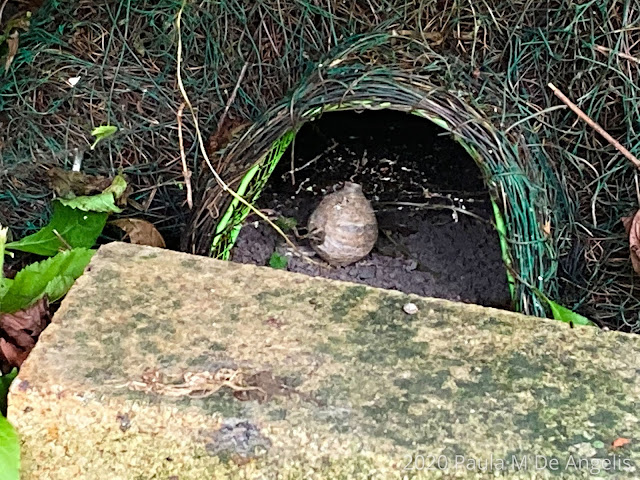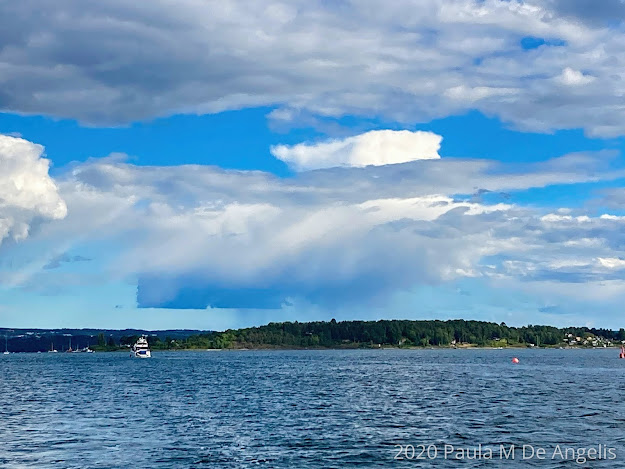“The most regretful people on earth are those who felt the call to creative work, who felt their own creative power restive and uprising, and gave to it neither power nor time.”
― Mary Oliver
I have in previous years written many posts about choice and that we choose our own lives to a greater or lesser degree. The pressure to conform to the modern life around us and to choose against our inner desires to live life more on our own terms is enormous. The pressure to be a workaholic, to prioritize work at all costs, to want all the material things money can buy, to always choose what is better than what we have now (to never be satisfied with what one has), to be constantly busy and active--all these things are driving forces that society supports and even adulates. If you do not want to be a workaholic, if you want to slow your life down, if you don't want a bigger house or a bigger car, if you want time to reflect on life, you risk being labeled as unmotivated or unambitious. And that may be the case, at least in the context of wanting
those particular things. But there are some of us who do not want bigger, better, and more all of the time; some of us are content with the material blessings that we have attained/been given and want more time to reflect on life, especially now as we get older. Some of us want, and have wanted all our lives, as Mary Oliver so aptly writes, to follow the 'call to creative work', for no other reason than to follow that call. Not because it will make us rich or give us more material things, but because it gives us the chance to express ourselves in the unique way that only each of us can do. Yes, we need money to live and to function in society. But we don't need to drive ourselves to an early grave in a futile attempt to 'have bigger, better, more', because once we reach one material goal, there is always more to want, in other words, a new goal.
Each of us is unique and gifted with talents that others do not have, and others have talents that
we do not have. And that is what makes the world a wondrous place to live in. We each share what is uniquely ours with others. It doesn't matter if the world judges one harshly or if one is unsuccessful at what one creates. The definition of success in our society is a bit boring, because it is always equated to how much money one can make. Georgia O'Keefe wrote “Whether you succeed or not is irrelevant, there is no such thing. Making your unknown known is the important thing--and keeping the unknown always beyond you.” She understood the call to creative work and the importance of ridding our minds of terminology that keeps us prisoners of conformity--successful/unsuccessful; ambitious/lazy; efficient/ineffective. Rigid 'either/or' thinking does not help us to find a middle ground, and that is what most creative people need. It may not be possible to quit our jobs and pursue our creative leanings full-time; but a middle ground might be working at a less stressful job in order to have the time to pursue creative hobbies in our free time. Many writers and artists worked full-time at other jobs and pursued their crafts alongside their jobs. However, very few of us will reach the point where our creativity (e.g. our writing, painting, photography) can support us and/or families financially. But the middle ground allows for both. Still, we can live with the nagging feeling that we should have conformed to society's definition of success--that we should have made more money, had a fancy job title, had a bigger house, or a newer car. Some people will never be happy until they have attained (their view of) material success, but once they earn what they think is enough money, they will set themselves a new financial goal. The amount of money that equates to success will always be a moving target. It seems obvious to me that personal happiness is not based on having a specific amount of money, but this is not obvious to some people.
To choose our own path in life is to move out against an ocean that pushes us back to shore, no matter how often we try to head out onto the water, to brave the waves. You might think that the pressure to conform is greatest when one is a teenager or young adult. It probably is if you look at the statistical data, but the pressure to conform doesn't lessen when one is older. If you want to retire earlier than age sixty-seven, for example, there are people who will try to talk you out of it by telling you that you will be bored, that you will miss the workplace, or that you need the social interactions that the workplace provides. Many societal and political leaders are now pushing for people to work longer, into their seventies. That's fine for those who want to do that, but it should never become the norm. These types of people have little idea of how to live their lives without a company to define their lives for them, to give them their identities. They don't understand that the reason
you might want to retire early is to have the time to pursue your creative activities after a lifetime of dedicating
your time and energy to
realizing the goals and visions of others. So the pressure to conform to the 'new norm' is strong; striking out against the new norm is guaranteed to get people talking
about you and
to you about how you will regret retiring early. Interesting that they talk about regret when it comes to retiring early, but not when it comes to not fulfilling
your personal goals and dreams. I applaud one of my colleagues who retired last year to devote his free time to painting. He was honest about his desire to paint and had no desire to continue to work as a consultant for his workplace, to which he had devoted many years. He was retired from the work world and had plans to do other things that he had put on hold for many years.
Very few people are willing to talk about the regrets they may have for choosing
against their creativity throughout their lives. Choosing against your creativity is as simple as having an idea that one doesn't write down or reflect upon; it is as simple as saying to oneself that this idea or vision is not worth exploring further. Or as simple as saying that I don't have the time to pursue this. But what one is really saying is that one doesn't have
the will to pursue it. That is the biggest problem for most of us--the will to choose
for our creativity. Because what if that idea or vision that you toss away is the only one of its kind, the one unique idea or vision that never sees the light of day because you tossed it into the waste bin? I know that I get irritated with myself when I don't write down an idea or thought that I know would make a good blog post or an interesting poem or short story. The ideas get lost forever; it's hard to remember them a day or a week later. I tell people that if you have a creative thought, write it down somewhere, and come back to develop it at a later time. It's worth it.
There are many ways to be creative and creativity is not limited to writing, painting or the arts. We are called each day to be creative where we are--at home, in the kitchen, in our sewing and hobby rooms, in our gardens, among other places. We should give ourselves a pat on the back every time we choose
for creativity and
against conformity. Maybe as simple as preparing a new recipe from scratch rather than buying frozen prepared food. If there are creative pursuits you wish to follow, the time is now. As I have written in many posts on this blog over the years; "If not now, when?"
![]()
![]()
![]()
![]()
![]()
![]()
![]()
![]()
![]()
![]()
![]()
![]()
![]()
![]()
![]()
![]()
![]()
![]()
![]()
![]()





/media/img/mt/2020/03/Atlantic_Trump_corona_2/original.png)



/media/img/mt/2020/06/Atlantic_second_C_v2/original.png)




































